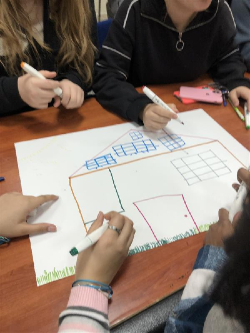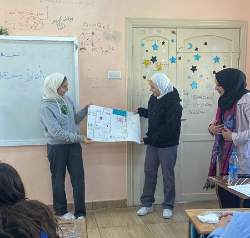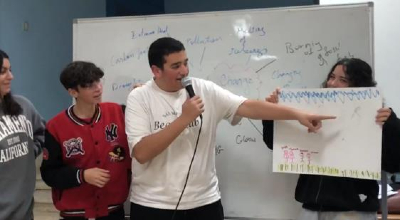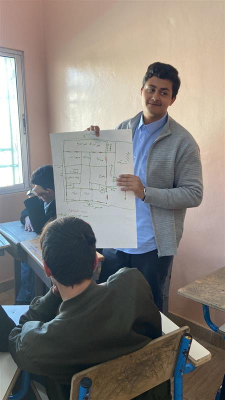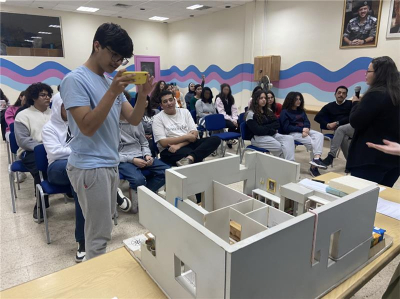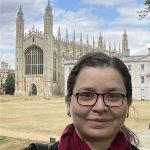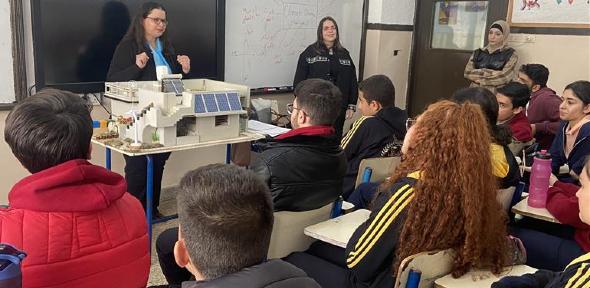
In 2022, a project titled "Normalising and integrating knowledge on sustainable residential buildings design and construction in Jordanian schools' curriculum" received a grant from the Energy IRC. This collaborative effort between Cambridge-based research teams, combining architectural and educational expertise aimed to explore students' perceptions of climate change and their role in addressing environmental challenges.
By Maiss Razem
From the Department of Architecture, Maiss Razem, Professor Minna Sunikka-Blank, and Dr Rihab Khalid along with Irum Maqbool from the Faculty of Education led this initiative to assess Jordanian tenth-grade students' perceptions of climate change and the role of schools in mobilising youth towards climate action. Partnering with the Jordan Green Building Council, the project sought to integrate interdisciplinary insights and practical learning into Jordanian schools' curriculum. This blog post highlights the project's objectives, findings, and its potential impact on fostering agency for climate action among the youth.
The Urgent Need for Climate Action in Jordan
With Jordan ranking as the world's second water-poorest country and heavily reliant on energy imports, sustainable design and construction along with environmentally conscientious users play a crucial role in mitigating climate change effects. The country's rapidly growing population and housing demands further emphasise the significance of engaging young minds in tackling climate challenges. With a young population comprising 63% of Jordan's inhabitants, engaging youth in reflecting on climate challenges within their daily surroundings, such as homes and schools, holds great promise for practical learning and meaningful climate action, which this project aimed to explore.
Assessing Students' Climate Change Perceptions and Knowledge
To gauge the understanding of climate change and the role of education in integrating this knowledge, the project used questionnaires with 131 tenth-grade Jordanian students and interviews with teachers. The results revealed that a significant majority had limited knowledge about climate change. Interviews with teachers further highlighted that their approach to climate change education was often confined to general and scientific knowledge, lacking integration with local daily experiences. The findings revealed that while students were aware of critical climate change risks faced by Jordan, such as water scarcity and temperature rise, their understanding of potential solutions primarily revolved around technological advancements and governmental actions. This highlighted the need for climate change education (CCE) to incorporate multidisciplinary perspectives and anchor adaptation strategies to students' lived experiences.
The project also entailed delivering participatory workshops that introduced a demonstrative model of a house that integrated sustainable design principles and was found to engage the students in thinking of their own agency at the household scale by reducing demand on resources such as water, energy, and materials.
Engaging Students through Participatory Workshops
The workshop was designed to present architectural knowledge in an educationally interactive manner. Adopting a design-based learning approach, Maiss along with members from the Jordan GBC co-presented and delivered the workshop by showcasing a demonstrative model of a sustainable house (that was funded by the Fulbright Community Action Grant in 2015) at three schools.
These workshops elicited active participation from the students and prompted thought-provoking inquiries. Students became reflexive of their own behaviours and questioned the business-as-usual. When asked to raise their hands if they showered for ten minutes, twenty minutes, or left the faucet open till the hot water came, more hands were raised for the latter options. This example helped make the students aware of their role in conserving water. One student commented that the house model would be perfect if a swimming pool was added. This led to a discussion of whether having private swimming pools was a sustainable way of life. As we reminded the students of the water stress Jordan faces, the students understood that this was a very environmentally taxing luxury. When shown the interior of the house, several students commented that it is quite small compared to the houses we live in. As we explained the need for compact design to minimise the material footprint of the house the students’ normative understandings of what ‘normal’ houses should be were challenged. A student wondered during the workshop ‘if we have that much solar energy (300 sunny days), how come we’re still using fossil fuels?’ and ‘Why do we keep constructing buildings on land and encroaching on nature?’. By encouraging students to reflect on their behaviours and challenge societal norms, the workshops fostered critical reflection on taken-for-granted issues, affirming that CC education should not only be confined to science classes.
Expanding Climate Change Education Beyond Science Classes
One key finding of the project was that climate change education should not be confined to science classes alone. Questionnaire results indicated that students perceived the responsibility for climate change solutions as primarily governmental, following top-down approaches to meet expanding demand on resources, while less attention was given to the role of individuals, households, and demand-reducing top-down policies. Challenging the unsustainable standards of living that we have come to accept can be stimulated through teaching, integrated in multiple subjects in CCE, and educationally approached from historical and critical perspectives.
Fostering Students' Agency and Intention for Climate Action
The project successfully instilled students' intention for climate action at a scale they can enact agency. Post-workshop assessments revealed students' readiness to implement climate-conscious behaviours in their households and influence their family and friends positively. From suggesting simple changes in room colour and advocating for water and electricity rationing to avoiding extravagance, students showcased their newfound understanding of sustainable practices. At the end of the workshop, we were pleased to see the creativity of students in representing the new knowledge they gained when they collaborated to draw their dream sustainable house.
Moving forward towards multidisciplinary CCE
Two main outputs from the project included a school guideline report and a policy brief with recommendations for educators, curriculum developers, and policymakers to enhance students' agency in climate action. Overall, this experience was valuable for us to learn how CCE ought to integrate multiple perspectives, which aligned with the core mission of this funded interdisciplinary project, explored in designing and delivering interactive and participatory workshops that integrated building design and learning strategies. Recognising that young adults often experience climate distress and anxiety; such workshops and design-based learning can encourage students to process their emotions around climate change and empower them to make a difference in their local communities.
The future is yet to be envisioned by the youth and we believe the workshop experience successfully invoked students’ contemplation of (un)sustainable buildings and daily habits. Building on this, the interactive and participatory workshop holds promise for adoption in other regions facing similar challenges. Moving forward, we aspire to communicate the project’s findings and promote multidisciplinary CCE beyond science classes to stakeholders in the Jordanian educational landscape.
The Energy IRC was pleased to support this work through its Energy IRC Small Grants Award.
|
Maiss Razem is a PhD researcher and IsDB scholar in the Behaviour and Building Performance Group at the Department of Architecture, University of Cambridge. Her research interests explore the socio-technical aspects that contributed to escalating energy demand and comfort standards that shape building design and use, investigating especially cooling energy demand and practices. Driven by the need to mitigate global heating beyond technically centric solutions, Maiss investigates the role of marketing, users’ comfort perceptions, and design practices’ aesthetic and environmental sensibilities in diffusing use of Air Conditioning in Jordan, which won the Outstanding Impact and Engagement Postgraduate Paper Competitionin 2022. She is a LEED AP, educator, part of the Daylight Award Community and a Certified Dialogue Education Practitioner (CDEP) from the GLP. |


